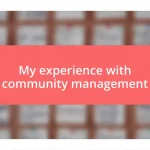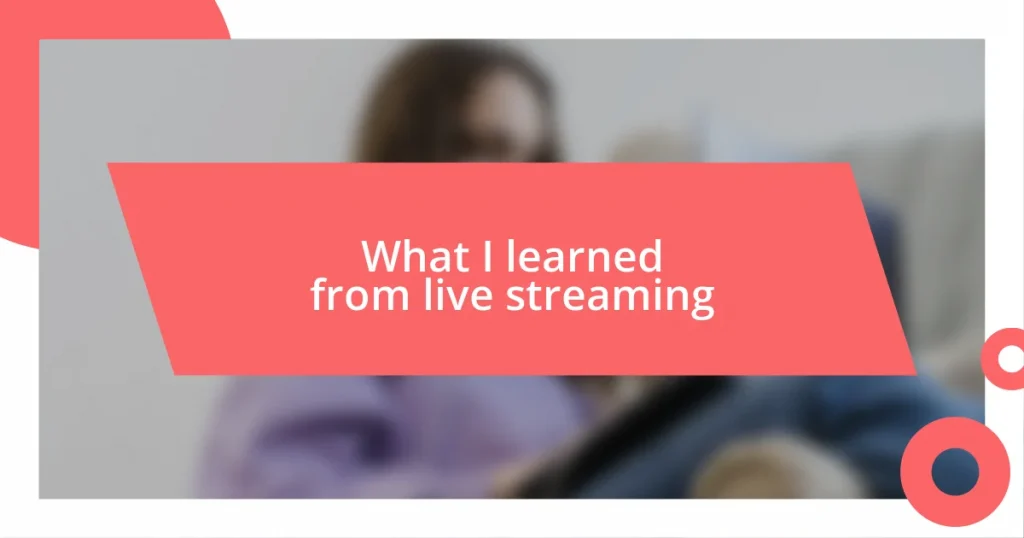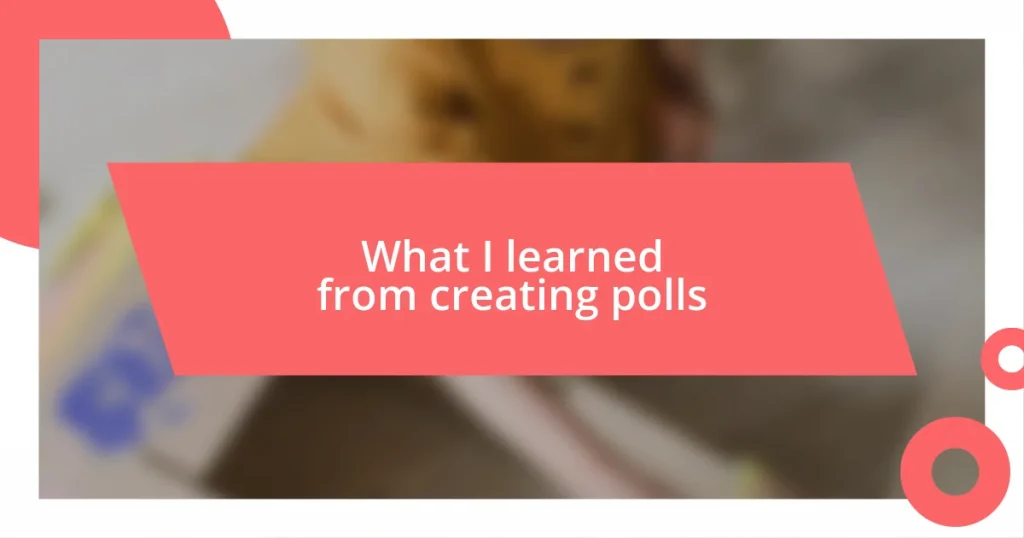Key takeaways:
- Understanding your audience and timing is crucial for an effective promotions strategy, emphasizing the importance of storytelling over flashy graphics.
- Recognizing personal strengths and engaging in effective communication fosters professional relationships and enhances promotional efforts.
- Setting clear, measurable performance goals and actively seeking feedback can significantly drive personal and team growth in a promotional context.
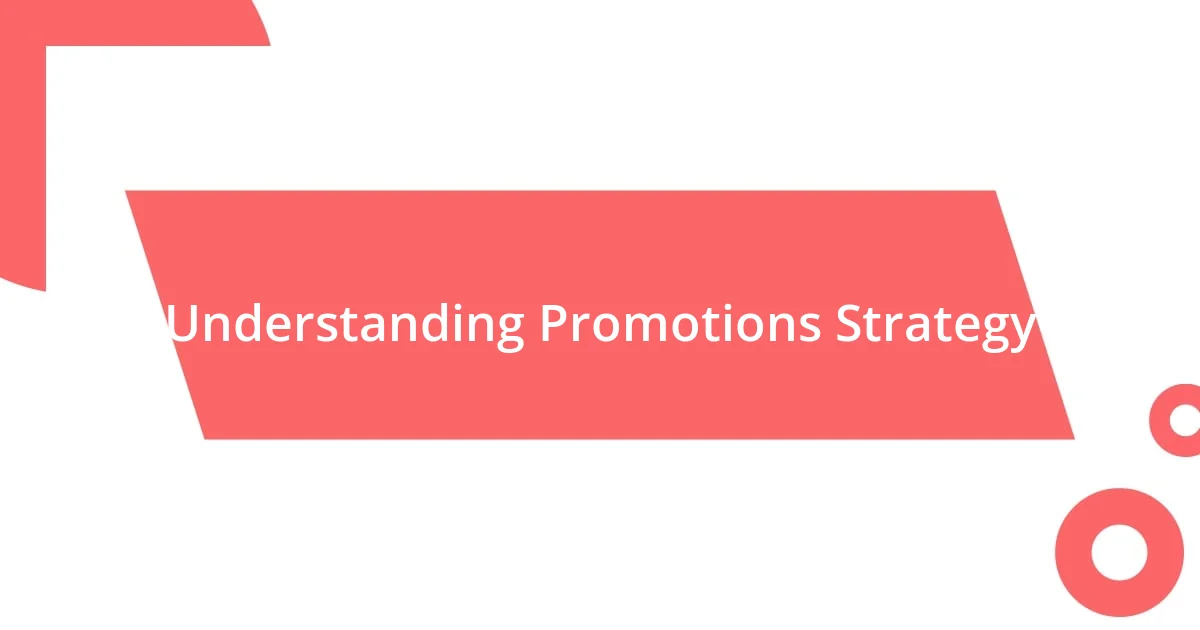
Understanding Promotions Strategy
Understanding a promotions strategy is more than just a checklist; it’s an exploration of what truly connects with your audience. I remember a time when I launched a campaign that fell flat. I had assumed that flashy graphics alone would draw people in, but I quickly learned that storytelling resonates far more deeply with consumers. Have you ever felt that moment of clarity when you realize your message isn’t reaching the right people?
In developing an effective promotions strategy, I’ve found that knowing your audience is key. It’s like anticipating what your friends would love at a dinner party — you don’t just serve what you like but what you know will make them smile. There’s immense satisfaction in crafting promotions that speak directly to your audience’s needs and desires.
Another important element is the timing of your promotions. I’ve often seen how the right message at the right moment can lead to incredible engagement. For instance, launching a summer sale just as the weather starts to turn can create excitement. Wouldn’t it be great if we could sense those perfect moments all the time? The synergy between timing and strategy can be the secret ingredient in driving success.
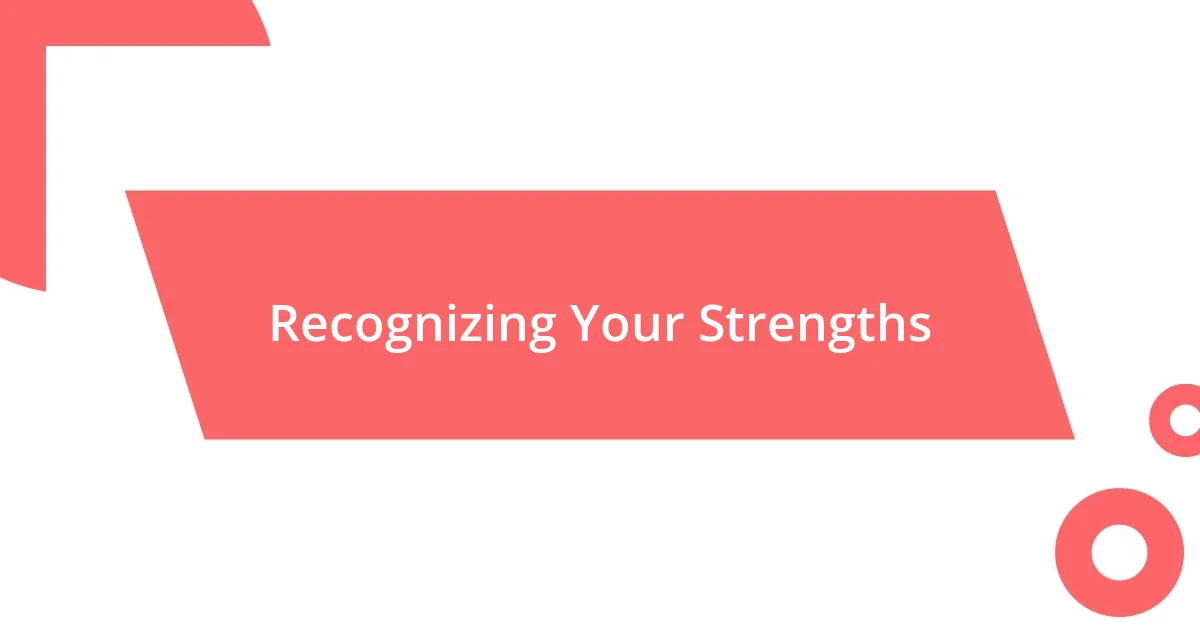
Recognizing Your Strengths
Recognizing your strengths is essential for any promotion strategy. I recall the moment I really acknowledged my knack for understanding market trends. It was during a product launch when I noticed a gap in the market for eco-friendly options. By leveraging this strength, I not only positioned my brand favorably but also connected with an audience eager for sustainable choices. Have you ever tapped into a personal strength and watched it transform your approach?
Sometimes, it’s easy to overlook our unique skills. I often remind myself of the time when I realized how effectively I could communicate with others. It began with casual conversations that turned into valuable relationships. Communicating with clarity and empathy allowed me to create promotional content that truly resonated. It’s fascinating how recognizing our strengths can lead to tangible results, isn’t it?
Moreover, self-awareness plays a crucial role in identifying these qualities. For example, when I started asking for feedback from colleagues, I learned about strengths I hadn’t recognized myself. It’s that external perspective that often highlights our potentials. Embracing both internal and external insights can be a game-changer in pinpointing what truly distinguishes us in the promotional landscape.
| Strength | Example from Experience |
|---|---|
| Market Trend Insight | Identified a gap for eco-friendly products during a launch |
| Effective Communication | Built relationships through clear and empathetic messaging |
| Self-Awareness | Feedback from colleagues revealed strengths I hadn’t noticed |
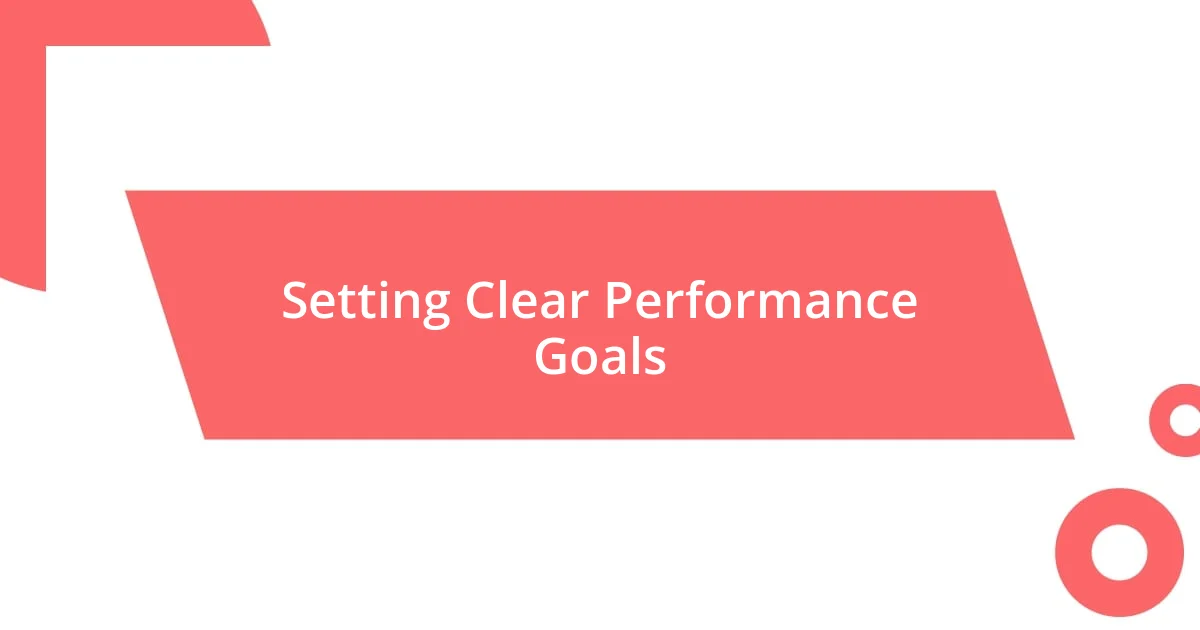
Setting Clear Performance Goals
Setting clear performance goals is a fundamental step in any promotional strategy. I vividly recall a project where I set specific targets for engagement and conversion rates. By breaking them down into measurable milestones, it transformed what initially felt overwhelming into a series of achievable steps. This clarity not only guided my actions but also kept my team motivated. Have you ever experienced the power of a well-defined goal lighting your way forward?
To ensure your goals drive results, consider the following strategies:
- Make them specific: Instead of saying “increase sales,” aim for “increase sales by 20% in three months.”
- Ensure they’re measurable: Utilize metrics and analytics to track progress.
- Set realistic yet challenging targets: Aiming too high can be demotivating while setting the bar too low may not push your boundaries.
- Give them a time frame: Establish deadlines to create a sense of urgency and accountability.
- Align them with team strengths: Each person should know how their role contributes to these goals.
By intertwining my personal insights with specific performance objectives, I’ve been able to align my team’s efforts and truly harness our collective strengths. It’s these small, actionable steps that lead to significant breakthroughs.
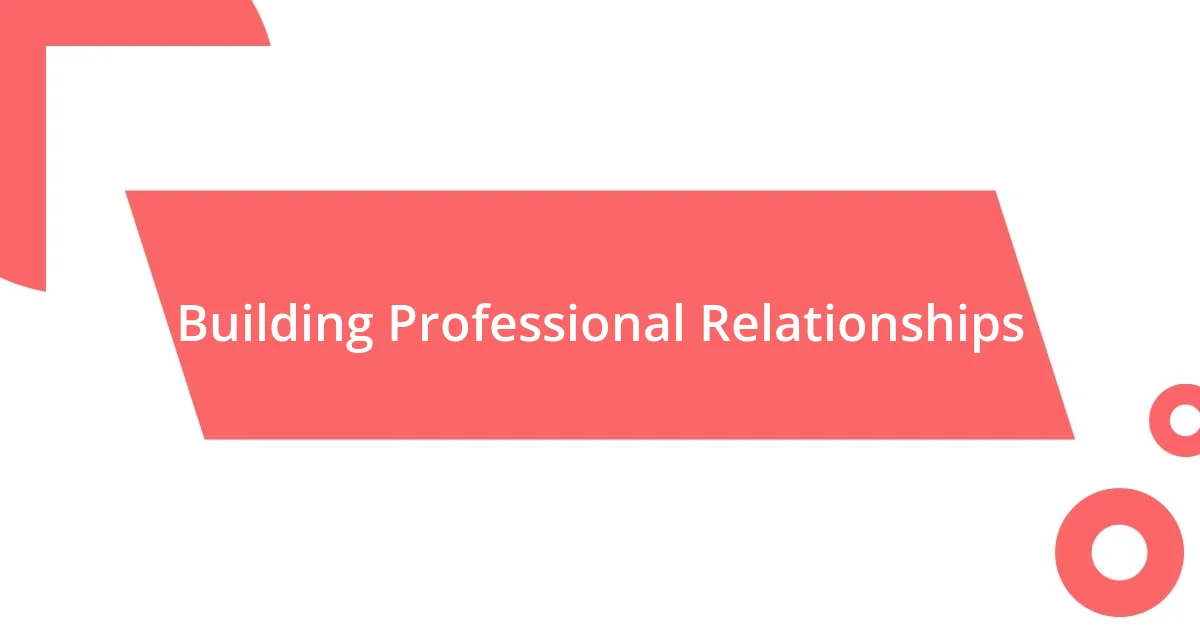
Building Professional Relationships
Building professional relationships is one of the most rewarding aspects of my career journey. I remember starting out in a new role and feeling a bit lost. Instead of keeping to myself, I decided to reach out to my colleagues over lunch. Those conversations not only helped me learn about the company culture but also laid the groundwork for a strong support network. Have you ever taken that simple step to connect, and felt doors open as a result?
Another time, I found myself collaborating on a project with a coworker whose expertise complemented mine perfectly. We regularly exchanged feedback and ideas. That open dialogue fostered trust and mutual respect, transforming our work into something innovative. It’s interesting how those interpersonal dynamics can elevate the quality of your projects, don’t you think?
Ultimately, I’ve learned that consistency is key in maintaining these relationships. I always make it a point to check in with my network, whether through a brief message or an occasional coffee catch-up. This not only keeps the connection alive but also shows that I value those relationships. For me, it’s about nurturing those bonds; they often lead to new opportunities down the line. How do you keep your professional connections thriving?
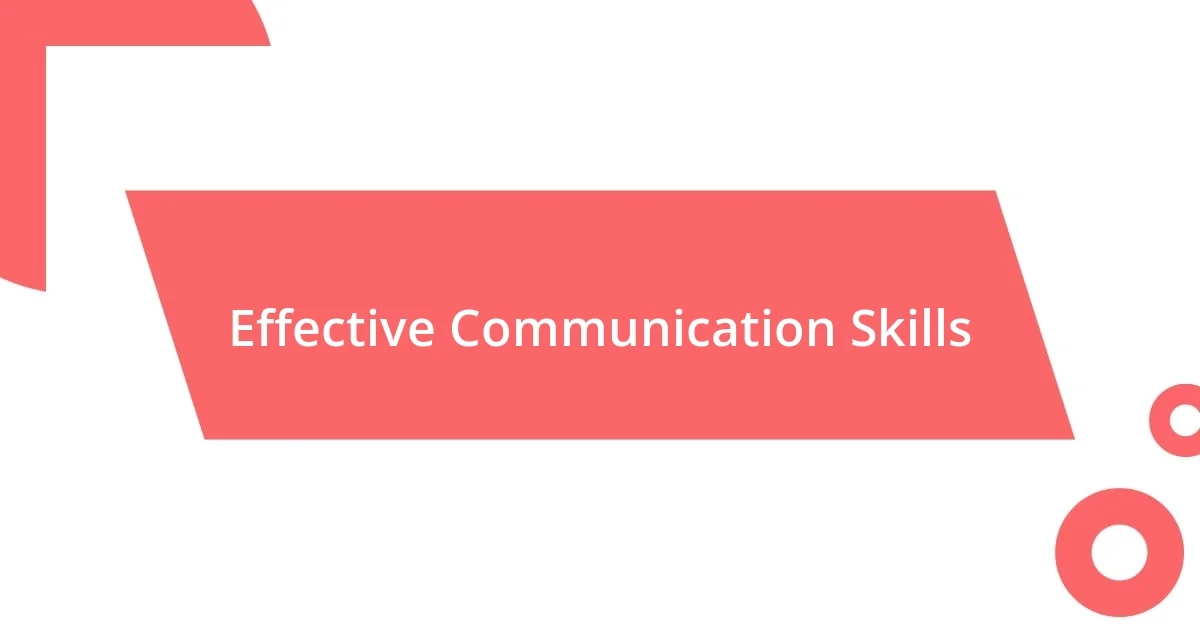
Effective Communication Skills
Effective Communication Skills
Effective communication has been a game-changer in my journey towards promotions. I recall a pivotal moment when I had to present a project to senior management. Nervous but determined, I focused on articulating my ideas clearly and confidently. That experience taught me the importance of not just speaking, but genuinely connecting with my audience. Have you ever noticed how a well-structured message can captivate listeners, making them eager to engage?
I’ve also found that active listening is just as crucial as speaking. During a recent team meeting, I took the time to really hear my colleagues’ perspectives before sharing my thoughts. This not only led to more meaningful discussions but helped build rapport among us. It’s fascinating how simply being present in a conversation can create an atmosphere of trust. Does it surprise you how often people overlook the power of truly listening?
Furthermore, I emphasize adapting my communication style to different situations and individuals. For example, when collaborating with creatives, I use more expressive language and visual aids, while with analysts, I lean into data-driven discussions. Tailoring my approach makes conversations more effective and ensures my message resonates. Reflecting on your own communication style, have you considered how adjusting it could enhance your interactions at work?
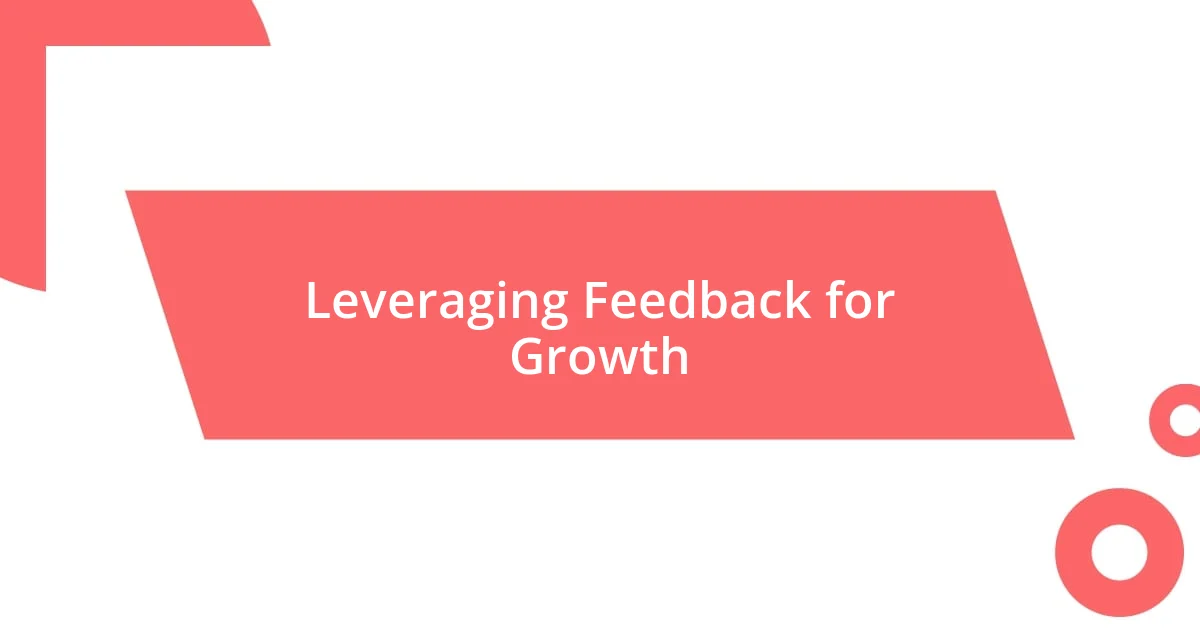
Leveraging Feedback for Growth
Feedback can be one of the most powerful tools for personal growth. I remember receiving constructive criticism from my manager on a presentation I delivered. Initially, it stung, but I took their insights to heart. After incorporating those suggestions in my next presentation, I not only gained confidence but also saw a remarkable improvement in my delivery. Have you ever experienced a similar revelation where feedback transformed your approach?
Embracing feedback can often feel uncomfortable, but it’s essential for development. I once participated in a feedback loop within my team, where we exchanged insights regularly. At first, it felt daunting to share my areas for improvement, but over time, it built a culture of honesty and support. This practice didn’t just refine our skills; it reinforced our commitment to each other’s success. Isn’t it interesting how vulnerability can lead to stronger team dynamics?
Moreover, I’ve learned to seek feedback proactively, which has been a game-changer for my career. When I transitioned into a leadership role, I set up regular one-on-ones with my team specifically to discuss their experiences and suggestions. It opened a valuable dialogue and created a safe space for growth. It’s amazing how this approach not only elevated my own leadership skills but also empowered my team members to voice their thoughts freely. Have you thought about how actively inviting feedback could influence your relationships at work?
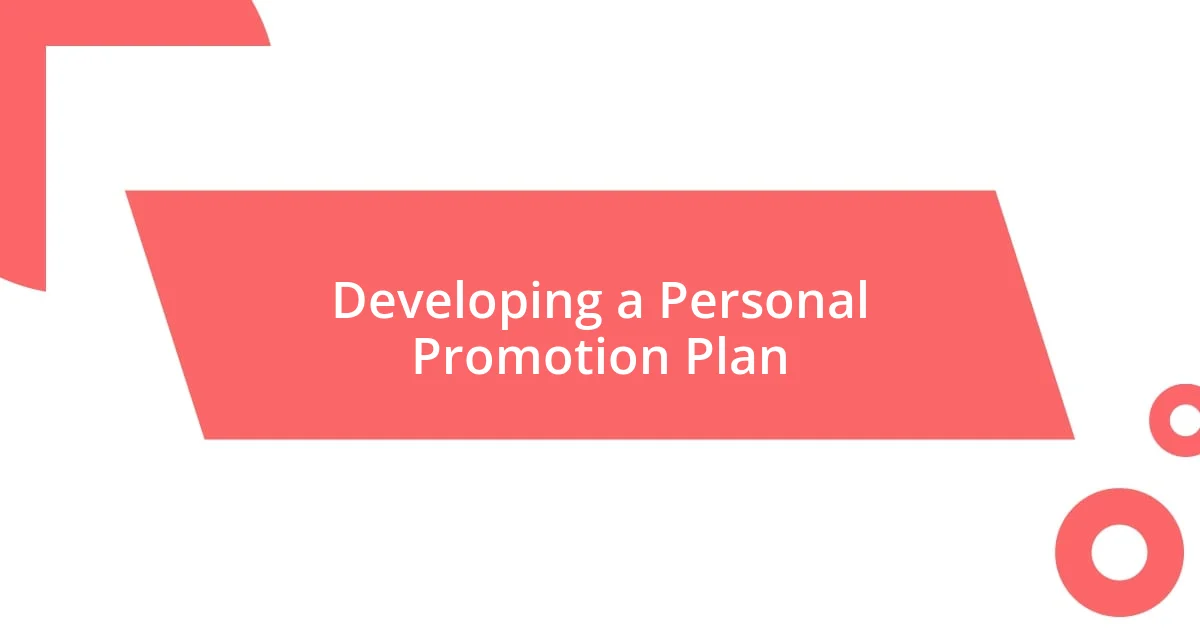
Developing a Personal Promotion Plan
I believe establishing a personal promotion plan starts with a clear vision of where you want to go. Reflecting on my own experience, I created a roadmap that outlined my career goals over the next few years. It felt like putting a puzzle together; I needed to identify not just the end picture, but also the individual pieces that would lead me there. Have you ever mapped out your career path? Seeing everything laid out helped me gain clarity and a sense of direction.
Setting specific, measurable goals has also been a game-changer for me. For instance, I aimed to improve my public speaking skills and enrolled in a local Toastmasters group. Each week, working on my storytelling and presentation abilities felt like a small victory. With every speech I delivered, I could feel my confidence grow. How rewarding it is to see tangible progress when you push yourself out of your comfort zone!
Lastly, I’ve found that networking plays a crucial role in my promotion plan. I remember attending an industry conference where I connected with a mentor. That conversation sparked new opportunities and opened doors I hadn’t considered before. Building relationships isn’t just about climbing the ladder; it’s about creating a supportive community that pushes you to excel. Have you invested time in connecting with others within your field? The connections you form can be as valuable as the skills you develop.









